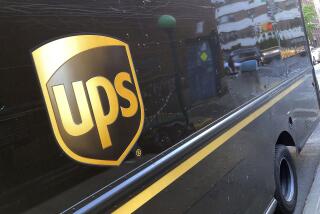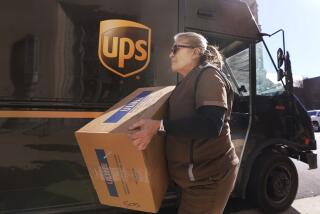UPS Plans to Sell 10% Stake in Initial Public Offering
- Share via
United Parcel Service of America Inc., one of the nation’s largest privately held companies, said Wednesday that it plans to sell 10% of its stock to the public in what could be one of the biggest initial share offerings in U.S. history.
The world’s leading package-delivery company wants publicly traded shares to give it another currency to make “significant strategic acquisitions in important markets around the world,” UPS Chairman James Kelly said at a news conference.
He declined to name any potential targets, but he identified the transportation-logistics and electronic-commerce industries as areas that UPS might consider after the offering, which is expected to be completed by the end of the year.
Atlanta-based UPS, with revenue last year of $24.8 billion, is the nation’s third-largest privately held company in terms of revenue, behind Cargill Inc. and Koch Industries Inc., according to the latest ranking by Forbes magazine. FDX Corp., the parent of UPS’ chief rival, Federal Express, had revenue of $16.8 billion in its fiscal year ended May 31.
UPS and its 330,000 employees deliver about 12 million packages and documents each business day, or more than 3 billion each year. The company, nicknamed Big Brown after the color of its ubiquitous trucks, has a fleet of 149,000 vehicles and 500 airplanes.
UPS maintains that its system each year “carries an estimated 6% of the U.S. gross domestic product,” which is the economic term for the nation’s total output of goods and services.
UPS currently is owned by about 125,000 of its managers, other employees and retirees, and “this fundamental element of our success will continue,” Kelly said, noting that current owners will retain 99% voting control of UPS after the public stock sale.
That’s because UPS plans to sell Class B shares to the public that will have only one vote apiece; current shareholders will continue to own Class A shares with 10 votes apiece.
For the last half a century, UPS’ directors have set the price of the company’s stock each quarter, and only once has the price been dropped. That happened in 1997 after a Teamsters strike crippled the carrier, and the price was cut by 50 cents a share.
The price currently is $47 a share, and there are about 560 million total shares outstanding, which gives UPS an internal valuation of $26.3 billion. But depending on market conditions and how UPS is measured against FDX and other publicly held rivals, its total market value could well exceed $30 billion after the IPO.
Hence, a 10% stake in the company might well fetch more than $3 billion, putting UPS’ offering within striking distance of the biggest IPO ever, last year’s $4-billion sale by oil company Conoco Inc.
Analysts weren’t surprised that UPS might be eyeing acquisitions in logistics, which is a hot growth sector for shipping concerns. Logistics firms provide other companies with the equipment, personnel and technology to handle the shipment, warehousing and packaging of their products and supplies.
UPS already devotes a minor part of its business to logistics, but it probably wants to make an acquisition to further build that business, especially overseas, said Timothy Quillin, an analyst with the investment firm Stephens Inc. in Little Rock, Ark.
“UPS may want to make acquisitions in Europe or Asia, to broaden its reach and broaden its scope of logistics services,” he said. “Customers are demanding more comprehensive services than just picking up a package and delivering it.”
The Internet also is expected to keep changing the dynamics of the package-delivery industry in coming years as the burgeoning online-shopping sector generates additional traffic.
In fact, on Wednesday, UPS said that it invested $4 million in Tumbleweed Communications Corp. to help it develop secure e-mail systems for businesses using the Internet to send documents.
More to Read
Inside the business of entertainment
The Wide Shot brings you news, analysis and insights on everything from streaming wars to production — and what it all means for the future.
You may occasionally receive promotional content from the Los Angeles Times.











